USE CODE WHA2022
Free U.S. domestic shipping on orders of $100 or more
Offer ends September 30, 2022
Find a digital-only special issue, “Missions & Conversions in World History,” of the Journal of World History FREE HERE.
Free U.S. domestic shipping on orders of $100 or more
Offer ends September 30, 2022
Find a digital-only special issue, “Missions & Conversions in World History,” of the Journal of World History FREE HERE.
The World History Association will be hosting its annual meeting in-person and virtually in Bilbao, Spain from June 23 to 25, on the theme “Distance, Mobility, and Migration.” The Journal of World History offers this accompanying special collection “Missions and Conversions in World History,” free on the Project MUSE platform through September 30. Select World History Titles in our Books Department will also be 30% July 1 through September 30 with coupon code WHA2022.
Missionary efforts are usually enacted on a global scale and have been an important force within world history. This special collection of articles seeks to enhance our understanding of missionaries and conversion and their place in the discourse on religion in world history. Some of the articles in this special collection focus on the religious beliefs of the missionaries and converts, and how those beliefs adapted to the cultures of parties. Other contributors analyze the political ramifications of missionary undertakings, while still others explore the varied cultural exchanges and entanglements which result from these encounters, many of which extended beyond the religious.
This special issue provides accessible resources for scholars and teachers worldwide and features Guest Editor Stephen S. Francis, who discusses the issue below.

University of Hawai‘i Press: Tell us how this special issue came together.
Stephen S. Francis: My personal area of research is the history of religion and society, and also family relations and material culture, so I was drawn to these articles that not only dealt with the personal ideological conversion of peoples, but also how missionaries and religion affected other aspects of society and culture beyond the intended reasons for proselyting.
UHP: Why is this issue important now?
SSF: Since the latter half of the twentieth century and the beginning of the twenty-first, religion throughout the world has undergone radical change, but perhaps no more so than in the past. So, I think it is beneficial for us to look at the impact and effects of past encounters to place the current developments in context.
UHP: How do you hope people will use this issue?
SSF: One of the goals of Journal of World History is to show broader interconnections of ideas that go beyond nations and regions, and in editing this volume, I gained greater insight into my own localized study by seeing the similarities and how my own work fits into this larger discourse. I hope that other scholars will do the same, and that it will enhance their own research and world view.
UHP: How are things changing as the world has reopened slowly? Are there many ways the pandemic has affected your own research and teaching?
SSF: Specifically regarding the topic of this issue, I know that several churches have altered the way they have proselyted during the pandemic, and I am eager to see how some of those changes will be kept and what ones will be discarded as the world reopens, which in several years will be fascinating to research. I, like many, had to cancel research trips due to the pandemic, but it also gave me time to reflect and focus on ideas that I may have ignored if life had continued as “normal.”
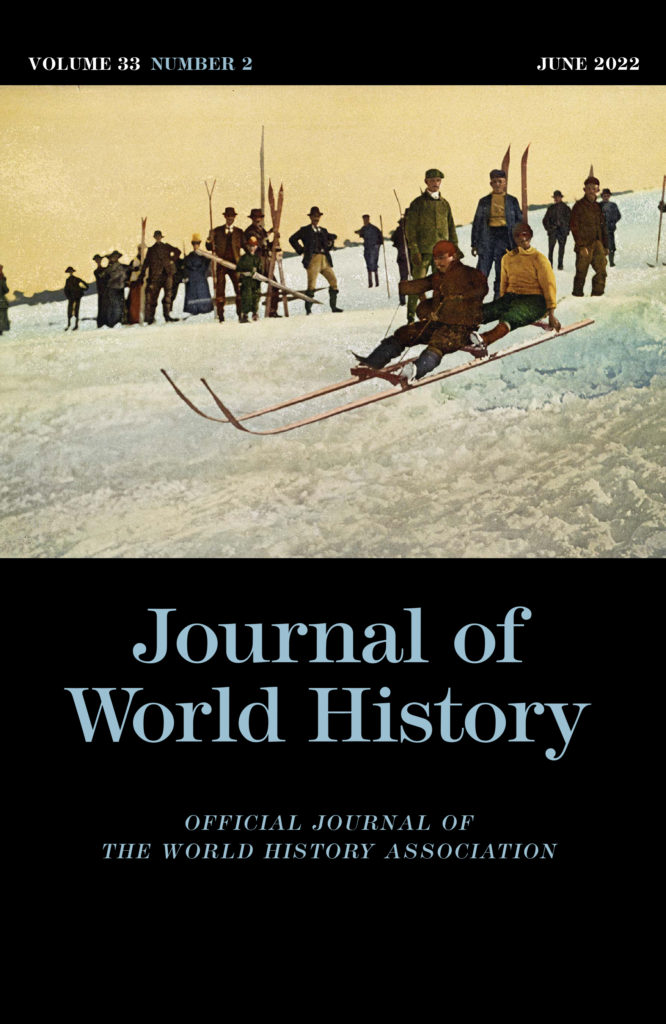
“Missions and Conversions in World History: An Introduction”
Stephen S. Francis
Indigenous Encounters with Christian Missionaries in China and West Africa, 1800-1920: A Comparative Study
David F. Lindenfeld
American Missionaries and the Opium Trade in Nineteenth-Century China
Michael C. Lazich
The Intricacies of Accommodation: The Proselytizing Strategy of Matteo Ricci
Yu Liu
“A Missionary from the East to Western Pagans”: Kagawa Toyohiko’s 1936 U.S. Tour
Robert Shaffer
From Transformation to Negotiation: A Female Mission in a “City of Schools”
Julia Hauser
“Not Far from the Kingdom of God”: Shamanism and Colonial Control in Russia’s Eastern Borderlands, 1853–1917*
Jesse D. Murray
The Jesuit Heresiological Discourse as an Enlightenment Project in Early Modern China
Qiong Zhang
The New Woman, Her New Clothes, and Her New Education: Missionary Encounters and Consuming the Exotic
Mona L. Russell
The World History Association will host its annual meeting both in-person and virtually, from June 23 to 25, on the theme “Distance, Mobility, and Migration.” The Journal of World History offers this digital special issue “Missions and Conversions in World History” free on the Project MUSE platform through the end of September 2022. Select World History Titles in our Books Department will also be 30% July 1 through September 30 with coupon code WHA2022.

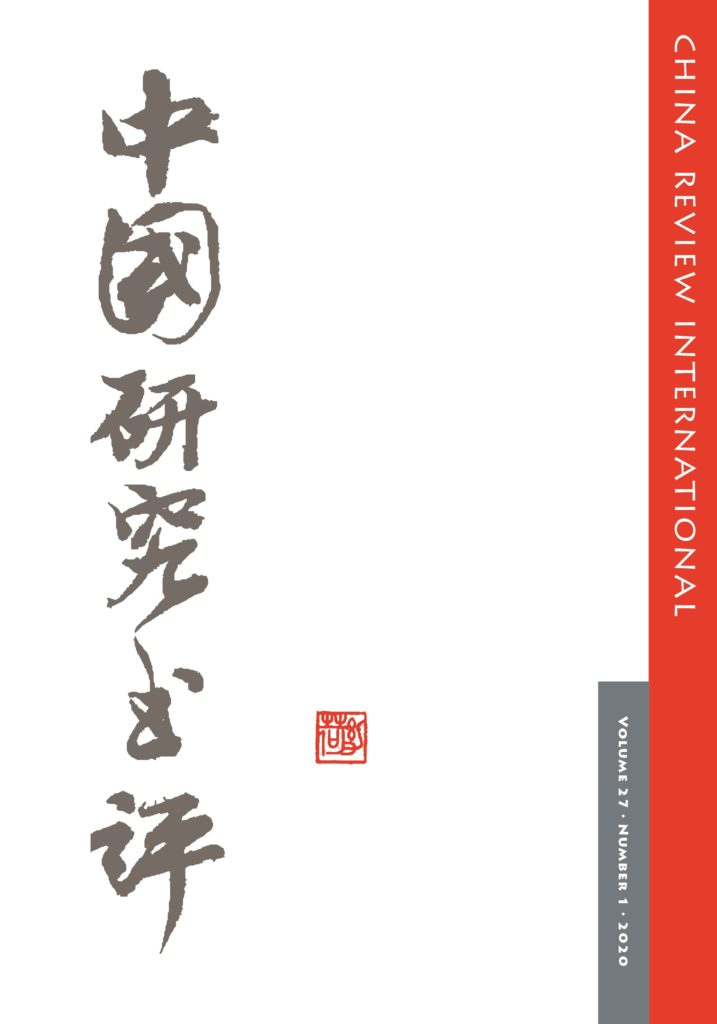
Volume 17-1 (2020)
Between Disaster, Punishment, and Blame: The Semantic Field of Guilt in Early Chinese Texts by Thomas Crone (review)
Michael Nylan
Dictatorship by Degrees: Xi Jinping in China by Steven P. Feldman (review)
John Sagers
Confucianism and Sacred Space: The Confucian Temple from Imperial China to Today by Chin-shing Huang (review)
Deborah Sommer
The Inconvenient Generation: Migrant Youth Coming of Age on Shanghai’s Edge by Minhua Ling (review)
Yinni Peng
Queer Chinese Cultures and Mobilities: Kinship, Migration, and Middle Classes by John Wei (review)
Shunyuan Zhang
Find more articles at Project MUSE.
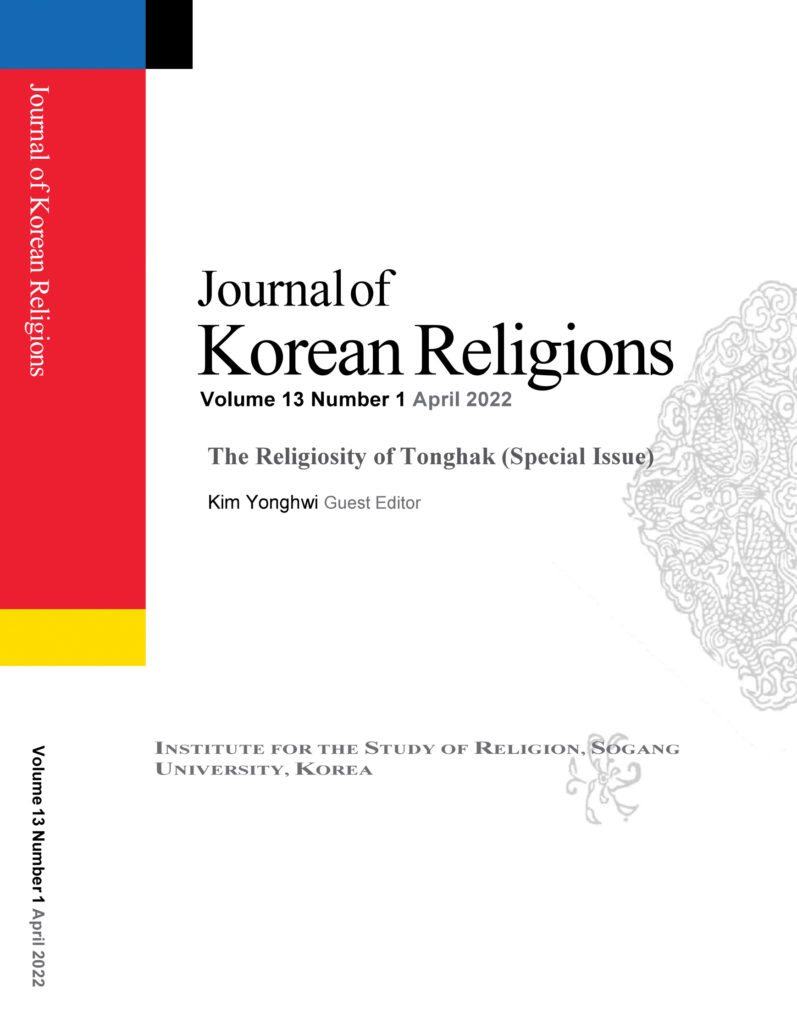
Volume 13, Number 1 (2022)
The new issue includes the following articles and reviews:
The Philosophical Turn in Tonghak: Focusing on the Extension of Ethics of Ch’oe Sihyŏng
Cho Sŏng-hwan
The Faith of Sich’ŏnju in Tonghak/Ch’ŏndogyo and its Method
of Practice
Kim Yonghae
Find more research articles and reviews at Project MUSE.
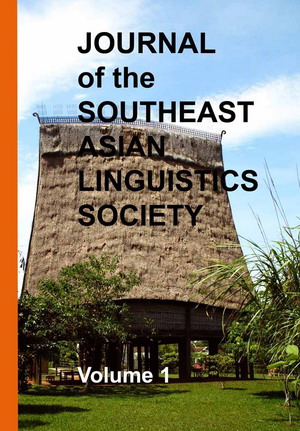
The new issue features the following introduction by Trang Phan, John Phan, and Mark J. Alves
The current issue is the result of a workshop held at the Harvard Yenching Institute in April of 2021, entitled Vietnamese Linguistics, Typology and Language Universals, and which featured nineteen linguists working on diverse aspects of the Vietnamese language, ranging from semantics to historical phonology. Our purpose in gathering was to take stock of the great leaps in Vietnamese linguistic research that have occurred over the past few decades, to bring together cutting-edge research from each subdiscipline, and to begin a new collaborative dialogue on Vietnamese linguistics, typology, and language universals. Most of all, it was our belief that the time had come to reconsider Vietnamese linguistics as a unified field of inquiry. As a result, a new academic organization was founded: the International Society of Vietnamese Linguistics.
In the past twenty years, research into the Vietnamese language has advanced exponentially, in tandem with developments in our understanding of syntax, semantics, phonetics, and phonology—both on the synchronic and diachronic levels. Specific work on the Vietnamese language now informs and even leads broader linguistic inquiry in a number of unprecedented ways. These new developments invite a concentration of state-the-field research into a single volume, one that will serve not only to summarize current issues in each subdiscipline of Vietnamese linguistics, but also to initiate a longer, more collaborative conversation about the Vietnamese language.
Our goals in this special issue are thus twofold: first, we seek to provide a snapshot of current research into Vietnamese syntax, semantics, phonology, and phonetics, from both the historical and synchronic points of view, that may serve as a resource for linguists interested in exploring our current understanding of the Vietnamese language. Second, we hope that this issue will also serve as an invitation to all linguists working on the Vietnamese language or related languages to contribute to a broader, more cosmopolitan discussion—one in which discoveries of one subdiscipline may serve to inform or enlighten another.
Find more articles at eVols.
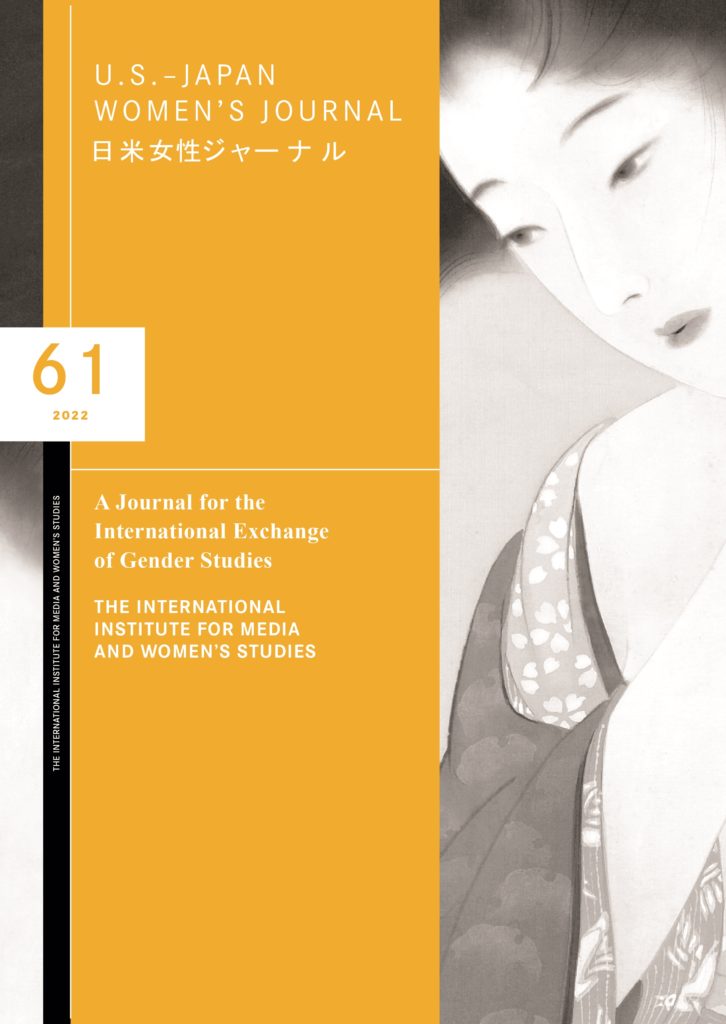
Volume 61 (2022)
The new issue features the following articles:
“Unseasonal Winds of Love”: A History of Prostitution and the Foreign Community in Early Modern Nagasaki
Martha Chaiklin
Historian and Feminist Kanō Mikiyo: A Lifetime of Writing Against Japanese Imperialism
Setsu Shigematsu
The “Emperor’s Heart” and the “Mother’s Heart”: What Gave Rise to the “Mothers of Yasukuni”
Kanō Mikiyo, Setsu Shigematsu
War-Themed Shōjo Manga as a Site for Female Subjectivity: An Aesthetic Analysis of Mothers and Daughters Narrating War
Kaori Yoshida, Kazumi Nagaike
Androids for the Stone Age?: Individuality, Space, and Gender in Murata Sayaka’s Convenience Store Woman
Ronald Saladin
Find more articles at Project MUSE.
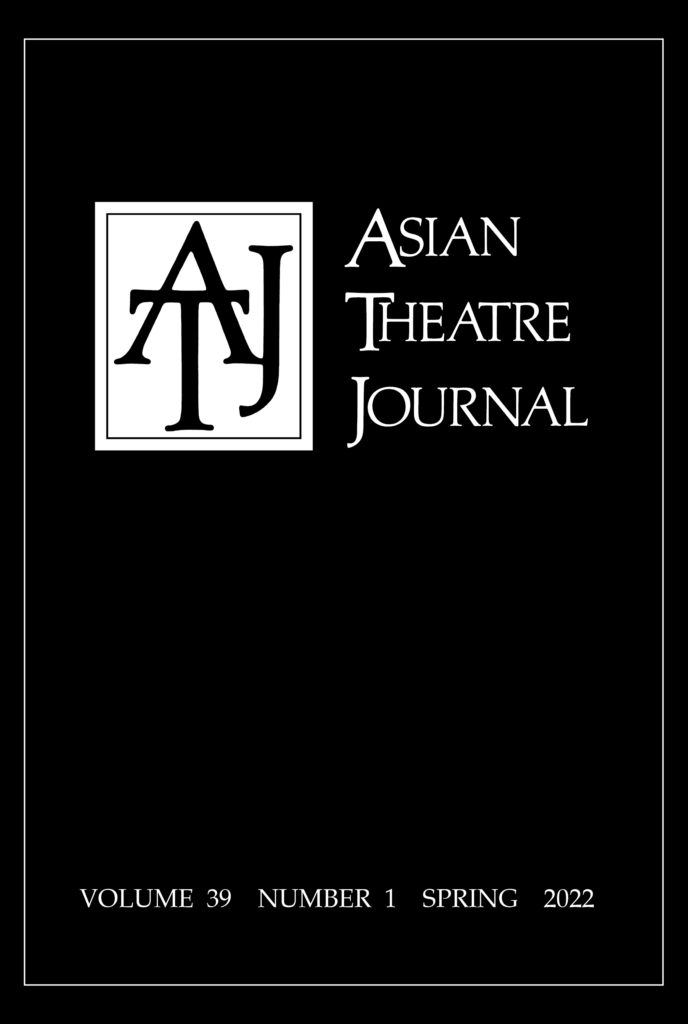
Volume 39, Number 1 (2022)
The new issue includes the following translations and articles:
A Journal of the Plague Year by Terayama Shūji in Collaboration
with Kishida Rio: “Contagious Magic” for a Time of Epidemic Translated by Tsuneda Keiko and Colleen Lanki
Yi Kwang-su’s Gyuhan (Sorrows of the Inner Room): Korea’s
First Modern Play?
Introduction and Translation by Owen Stampton
The “Homosexual Code” in Contemporary Korean Theatre:
The Case of Shakespeare’s R & J in Seoul
Yeeyon Im
Isan Contemporary Performance: Embodied Isan Tone in
Thai Contemporary Performance Making
Tanatchaporn Kittikong
Find more translations, articles, and reviews at Project MUSE.
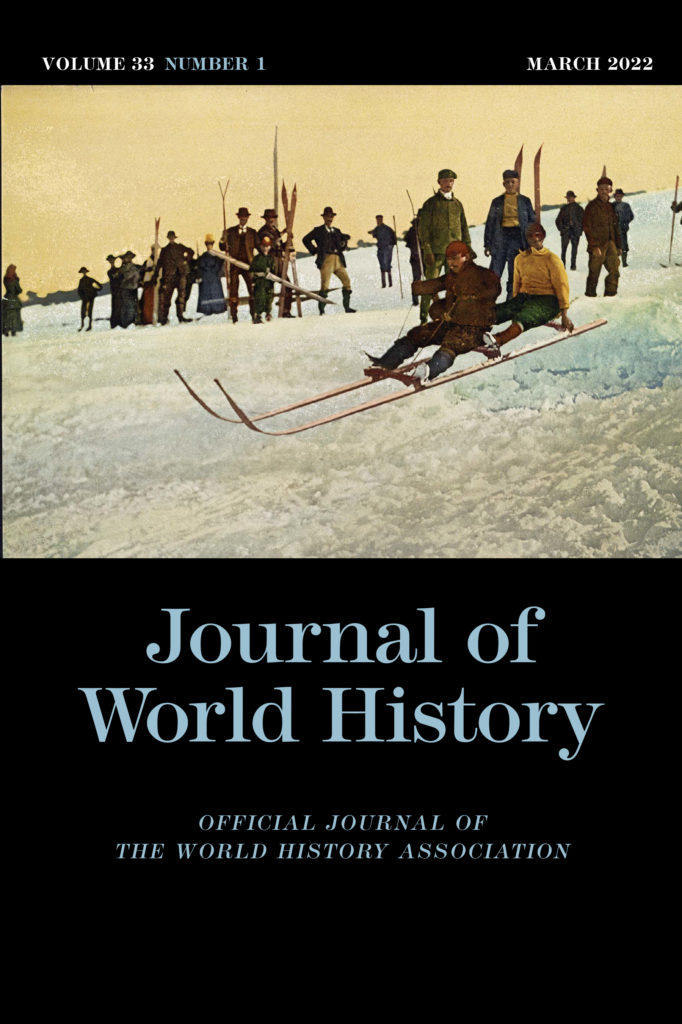
Volume 33, Issue 1 (2022)
A Short History of Feather Fans’ Spread and Cultural
Connotations: From Bronze Age Africa East to China
and West to Europe
Karen Eva Carr
Breaking the Containment: Horse Trade between the
Ming Empire and its Northern Neighbors, 1368–1570
Liping Wang and Geng Tian
Captive Colonizers: The Role of the Prisoners of War
from Poland-Lithuania and the Crimean Khanate in
the Russian Subjugation of Eastern Siberia
Dariusz Kołodziejczyk
Chains of Custody, Oceans of Instability: The Precarious
Logistics of the Natural History Trade
Vanessa Finney, Jarrod Hore, and Simon Ville
Abie Nathan and his Double-Edged Missions:
The Transnational Humanitarian and Human Rights
Activist during the Nigeria-Biafra War
Taiwo Bello
Find more articles and book reviews at Project MUSE.
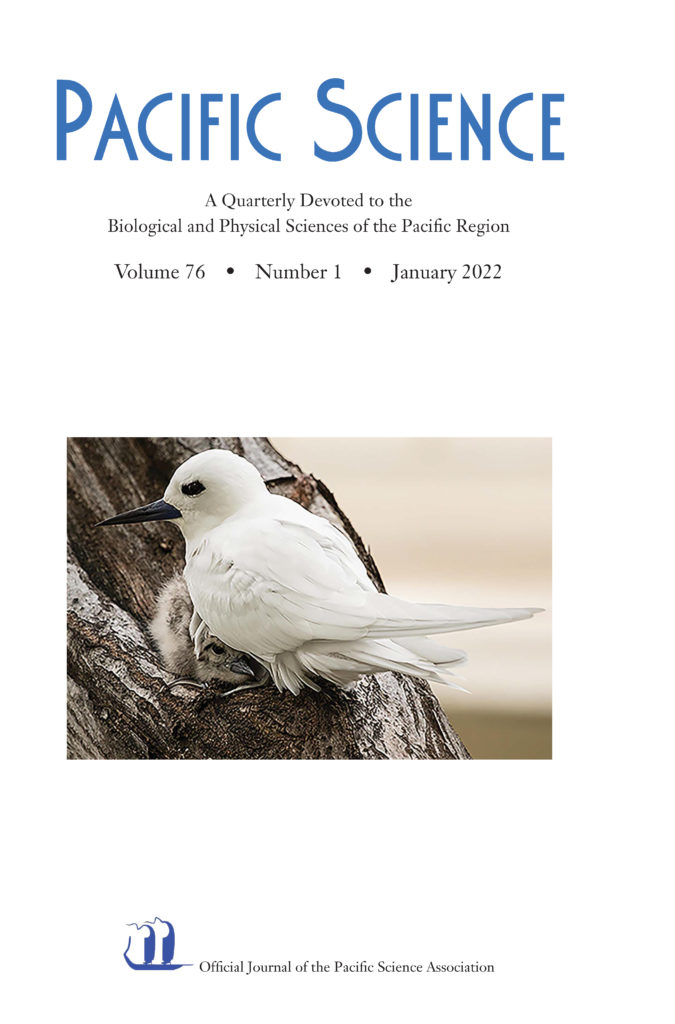
Volume 76, Number 1 (2022)
The new issue includes the following articles:
Spatial and Temporal Patterns of Fire on Saipan, CNMI
Ilan E. Bubb and Zachary B. Williams
Hawai‘i’s Toxic Plants: Species Richness and Species–Area Relationships
Donald K. Grayson and Heidi A. Lennstrom
Factors Affecting Breeding Success of White Terns (Gygis alba; Aves: Laridae) in Urban Environments of Honolulu, Hawai‘i
Eric A. VanderWerf and Richard E. Downs
Validation of the USPED Erosion and Deposition Model at Schofield Barracks, O‘ahu, Hawai‘i
Steven D. Warren and Thomas S. Ruzycki
Behavior of Hawaiian Petrels and Newell’s Shearwaters (Aves: Procellariiformes) Around Electrical-Transmission Lines on Kaua‘i Island, Hawaiian Islands
Robert H. Day and Brian A. Cooper
Epizoic Cyanobacteria and Algae on the Pelage of Pinnipeds:
A Literature Review and New Data for the Harbor Seal (Phoca vitulina)
Floyd E. Hayes, Sarah Codde, and Sarah G. Allen
A Short-Term Winner? Dramatic Increases in the Population of Mushroom Coral Lobactis scutaria (Anthozoa: Fungiidae) in Ka-ne‘ohe Bay, Hawai‘i from 2000 to 2018
Trevor Johannsen, Erik C. Franklin, and Cynthia Hunter
Find more research articles at Project MUSE.
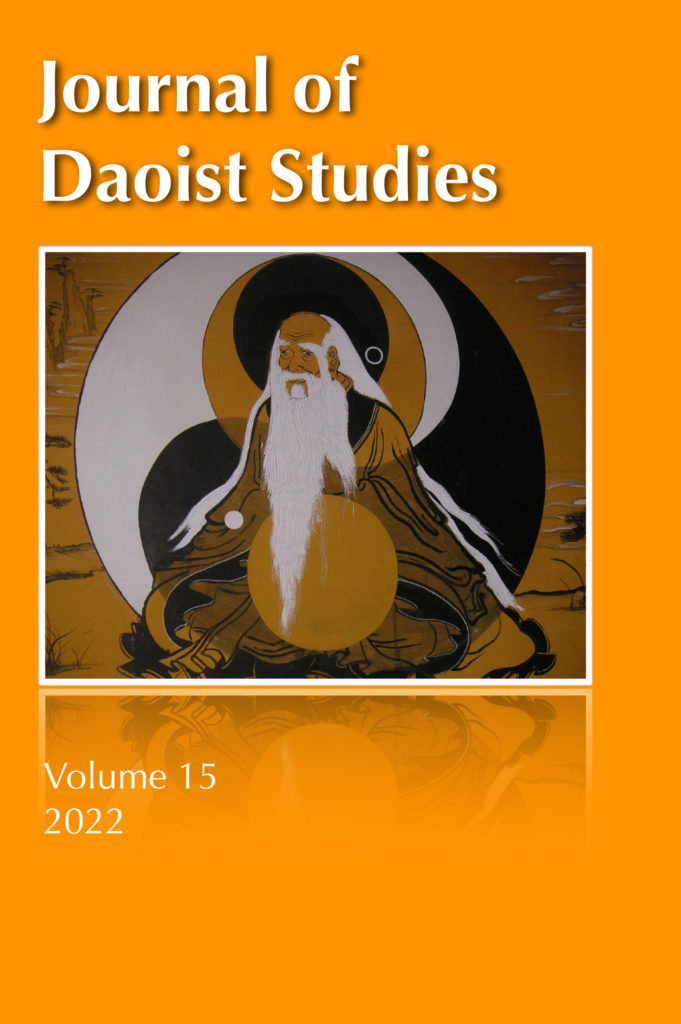
Volume 15 (2022)
The new issue includes the following articles and reviews:
Courting Transcendence: Poetry and Daoism in the Southern Dynasties (420–589)*
Zornica Kirkova
Dreaming of the Female Immortal: Xu Xishen’s Chants on the Paintings of Embracing the True
Yanning Wang
Water as a Symbol of the Great Dao: Literature, Philosophy, Science
Abraham S. Y. Poon
Deepening Perspectives on Spirit
Lonny S. Jarrett
Kang Jeungsan and the Origins of Modern Korean Daoism
Ko Nam-Sik
Daoist Talismans for Healing
Suzy Balliett
Find more research articles and reviews at Project MUSE.

The new issue is introduced by Editor in Chief Mark Alves, who states:
The volume contains 21 papers in total: five papers on historical linguistics, eleven papers on syntax and/or morphology, and five papers on phonetics/phonology. The languages covered in this volume are spoken in throughout the greater Southeast Asian region: Mainland Southeast Asia, Insular Southeast Asia, Southern China, and the Indian Subcontinent. The papers range from detailed descriptions of linguistic aspects of understudied languages to probing questions related to multiple groups of languages in the region.
Find more research articles and reviews at eVols.
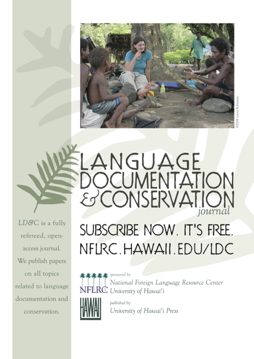
Volume 15 (2021)
The new issue includes the following articles and reviews:
Between Stress and Tone: Acoustic Evidence of Word Prominence in Kurtöp
Gwendolyn Hyslop
Automatic Speech Recognition for Supporting Endangered Language Documentation
Emily Prud’hommeaux, Robbie Jimerson, Richard Hatcher, and Karin Michelson
Using YouTube as the Primary Transcription and Translation Platform for Remote Corpus Work
Alexander Rice
Collaborative Fieldwork with Custom Mobile Apps
Mat Bettinson & Steven Bird
#KeepOurLanguagesStrong: Indigenous Language Revitalization on Social Media during the Early COVID-19 Pandemic
Kari A. B. Chew
Find more research articles and reviews at ScholarSpace.
In recognition of Black History Month, we offer the following journals, articles, and reviews. We invite you to explore and enjoy the following journal content online free through February 2022.
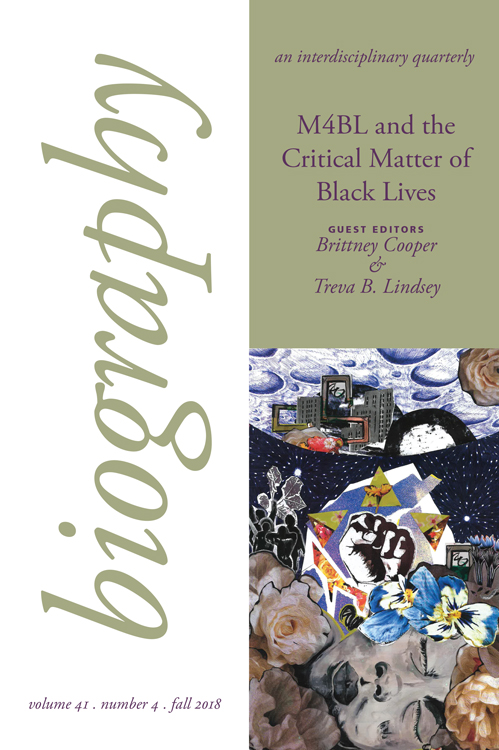
Volume 41, Number 4 (Fall 2018)
Introduction by Guest Editors Britney Cooper and Treva B. Lindsey:
Understanding the stories presented in this special issue as simultaneously about violence, resistance, (in)justice, and freedom, we center interrogations and representations of individual and collective Black lives to unearth both the possibilities and potential challenges for those living and fighting in the era of the Movement for Black Lives. In our call for papers, we offered these questions: What does “life” mean in the context of M4BL? What is the fundamental
meaning of “lives” when centering those on the margins? Each of these pieces directly and indirectly responds to these questions. As editors, we continually converse about the distinction between Black lives and Black life, while always connecting through our unwavering commitment to both.
Find more research articles and reviews at Project MUSE.
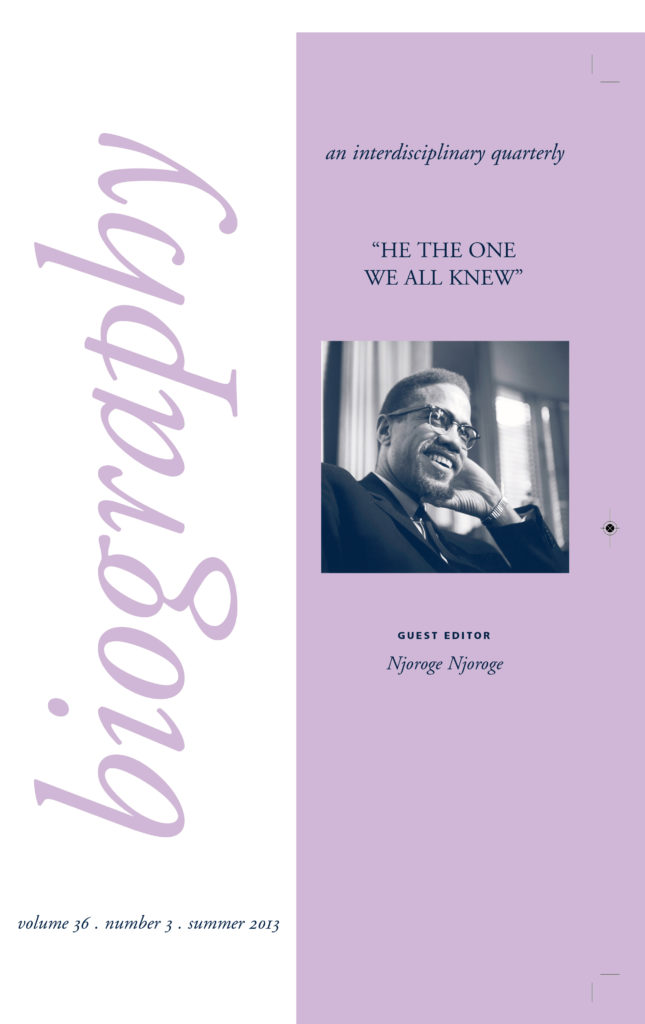
Volume 36, Issue 3 (Summer 2013)
Guest Contributor Njoroge Njoroge reflects on this issues dedication on the life and thought of El-Hajj Malik El-Shabazz known to most of Malcolm X. In reference to the compilation of articles in this issue Njoroge explains:
This cluster of essays is another re-discovery of Malcolm, one that attempts to give context and feeling to the life, world, words, and works of Malcolm. The collection is a modest contribution to the ongoing discussion, reevaluation, and interpretation of the life and political thought of Malcolm X. By examining the man and his times, in light of old wisdom and new scholarship, we can come to a better appreciation of Malcolm, the man and the myth. Each of the authors presents us with different “Malcolms”: He the one we all knew.
Find more research articles and reviews at Project MUSE.
Black Biography in the Service of a Revolution: Martin R. Delany in Afro-American Historiography
By Tunde Adeleke
Volume 17, Number 3, Summer 1994
African American Pioneers in Anthropology (review)
By B. C. Harrison
Volume 23, Number 2, Spring 2000
Biography and the Political Unconscious: Ellison, Toomer, Jameson, and the Politics of Symptomatic Reading
By Barbara Foley
Volume 36, Number 4, Fall 2013
Digression, Slavery, and Failing to Return in the Narrative of the Sufferings of Lewis Clarke
By Michael A. Chaney
Volume 39, Number 4, Fall 2016
Obituarizing Black Maleness, Obituarizing Prince
By Steven W. Thrasher
Volume 41, Number 1, Winter 2018
Call My Name: Using Biographical Storytelling to Reconceptualize the History of African Americans at Clemson University
By Rhondda Robinson Thomas
Volume 42, Number 3, Summer 2019
The Practice of Double Belonging and Afro-Buddhist Identity in Jan Willis’s Dreaming Me
By, Carolyn Medine
Volume 40, 2020
Black and Buddhist: What Buddhism Can Teach Us About Race, Resilience, Transformation, and Freedom ed. by Pamela Ayo Yetunde and Cheryl Giles, and: Buddhist-Christian Dialogue, U.S. Law, and Womanist Theology for Transgender Spiritual Care by Pamela Ayo Yetunde (review)
By Carolyn Jones Medine
Volume 41, 2021
Coloring Universal History: Robert Benjamin Lewis’s Light and Truth (1843) and William Wells Brown’s The Black Man (1863)
By Marnie Hughes-Warrington
Volume 20, Number 1, March 2009
Jazz and the Evolution of Black American Cosmopolitanism in Interwar Paris
By Rachel Gillett
Volume 21, Number 3, September 2010
“Town of God”: Ota Benga, the Batetela Boys, and the Promise of Black America
By Karen Sotiropoulos
Volume 26, Number 1, March 2015
Six Poems from Harlem Shadows
By Claude McKay
Volume 31, Number 2, (2019)
whatdoesfreemean?
By Catherine Filloux
Volume 32, Number 1 (2020)
Passing the Fire
By Wayne Karlin
Volume 32, Number 1 (2020)
I Investigate Lynchings
Walter White
Volume 32, Number 1 (2020)
The Black Settlers on Saltspring Island, Canada, in the Nineteenth Century
By Charles C. Irby
Volume 36, 1974
Published twice a year since 1989 by the University of Hawaiʻi Press, Mānoa: A Pacific Journal of International Writing has two issues of special interest to readers this month, which has been designated Kalaupapa Month by the Hawaiʻi state government and celebrates two important figures. Father Damien, the Belgian priest who cared for victims of leprosy at Kalaupapa, Molokaʻi, was born on the 3rd, and civil rights leader Martin Luther King Jr. was born on the 15th.
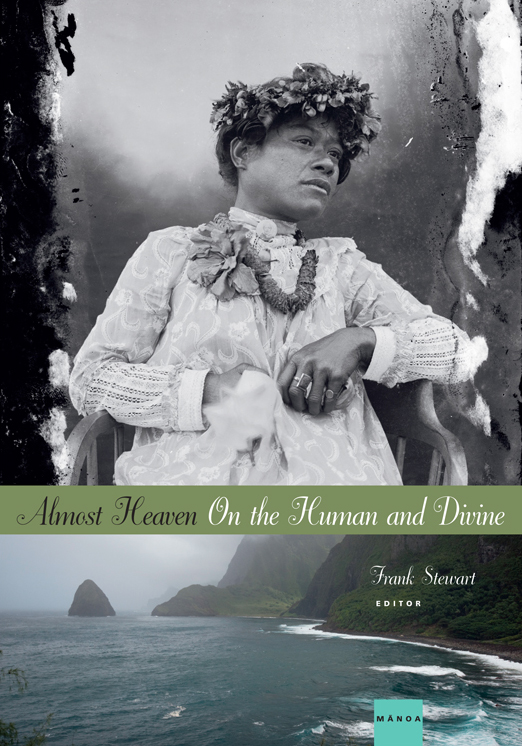
Almost Heaven: On the Human and Divine (winter 2011) presents Aldyth Morris’s play Damien in its entirety, plus a set of images reproduced from glass-plate negatives made at Kalaupapa in the early twentieth century. The images are from the collection of the Congregation of the Sacred Hearts United States Province. Morris was a Hawaiʻi playwright who received the Hawaiʻi Award for Literature in 1978 and worked for many years at UH Press.
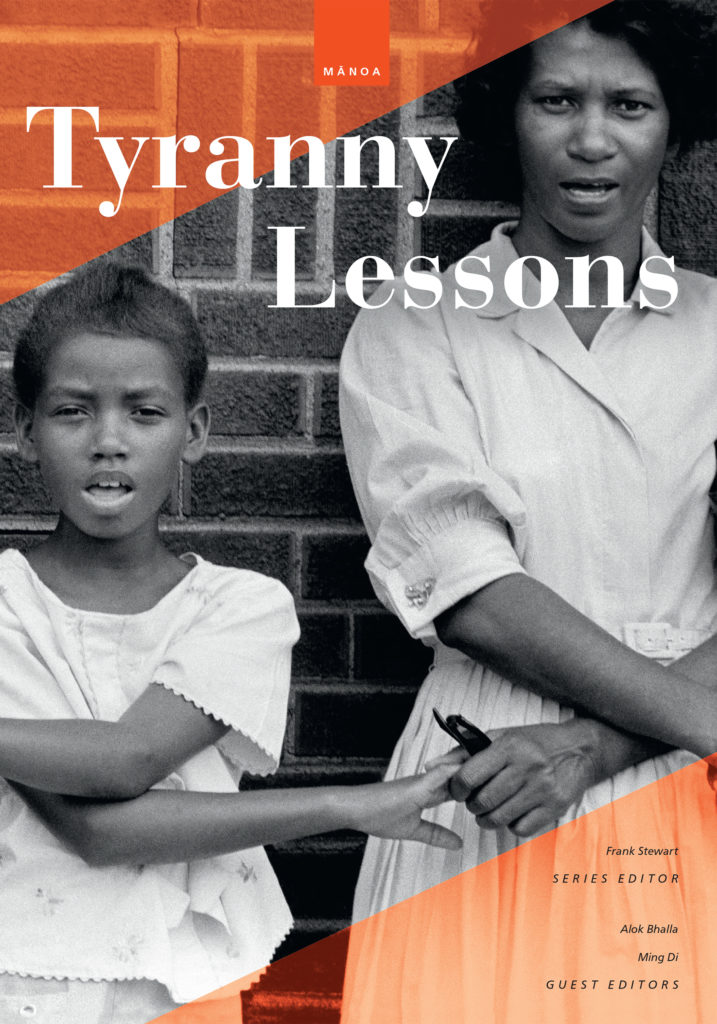
Tyranny Lessons: International Prose, Poetry, and Performance (summer 2020) features photographs from the 1960s by Danny Lyon from his book Memories of the Southern Civil Rights Movement. Lyon was the first photographer of the Student Non-violent Coordinating Committee and was jailed alongside Martin Luther King Jr. Working next to activists such as Julian Bond and Howard Zinn, he captured sit-ins, church bombings, speeches by John Lewis and other leaders, and the arrest and jailing of protestors.
Members of the UH community can view these works for free at Project Muse.
Links:
• Star-Advertiser article on Kalaupapa Month https://www.staradvertiser.com/2022/01/07/hawaii-news/
in-january-kalaupapa-month-hawaiians-reclaim-loved-ones/
• Mānoa website https://manoa.hawaii.edu/manoajournal/
• Almost Heaven https://muse.jhu.edu/issue/25083
• Tyranny Lessons https://muse.jhu.edu/issue/42693

Volume 40, Number 2 (2021)
The new issue includes the following articles and reviews:
“Making History”: Metatheatre in the Peach Blossom Fan
Allison Bernard
Find more research articles and reviews at Project MUSE.

Volume 22, Issue 2 (2021)
From the Guest Editors Rachel Emerine Hicks, Debra McDougall, and David Oakeshott in The Promise of Education: Schooling Journeys in the Southwester Pacific:
“Schooling journeys” is more than a metaphor in the southwestern Pacific. To step into a classroom, children and youth often travel hours each day or live for months at a time away from their families. The journey of schooling is rarely direct; it often winds between formal and informal learning and in and out of school, work, and home life. And the journey is expensive; many families struggle mightily to gather the money for fees, school supplies, uniforms, and transportation. Young people embark on these precarious journeys, and their families make sacrifices to support them, because schooling promises a better life—a move away from the backbreaking labor of subsistence agriculture toward a reliable salary that will better support their family and community. Because of the structural inequalities in school and a lack of jobs for those who complete schooling, however, few experience the socioeconomic advancement schooling promises. Still, students and their families continue to hope that schooling will lead to well-paid work. Even more important, though, going to school is seen as key to being a competent and effective person in society—increasingly for both women and men.

Volume 55 (2021)
The new issue includes the following articles, reviews, notes, and queries:
Aloha Space Age: NASA and the Hawaiian Islands, 1957—1970
David A. Smith
The First Attempt to Overthrow Liliʻuokalani
Ralph Thomas Kam
Dr. Richard You and the Golden Age of Hawaiʻi’s Athletics
John D. Fair
Incarcerating a Nation: The Arrest and Imprisonment of Political Prisoners by the Republic of Hawaiʻi, 1895
Ronald Williams Jr.
Hawaiian Women’s Fashions: Kapa, Cotton and Silk by Agnes Terao-Guiala (review)
Linda Arthur Bradley
Find more research articles, reviews, bibliographies, notes and queries at Project MUSE.

Volume 60 (2021)
The new issue includes the following articles and reviews:
Yosano Akiko in Belle Époque Paris / ベル・エポックのパリの与謝野晶子
Scott Mehl
Find more research articles and reviews at Project MUSE.
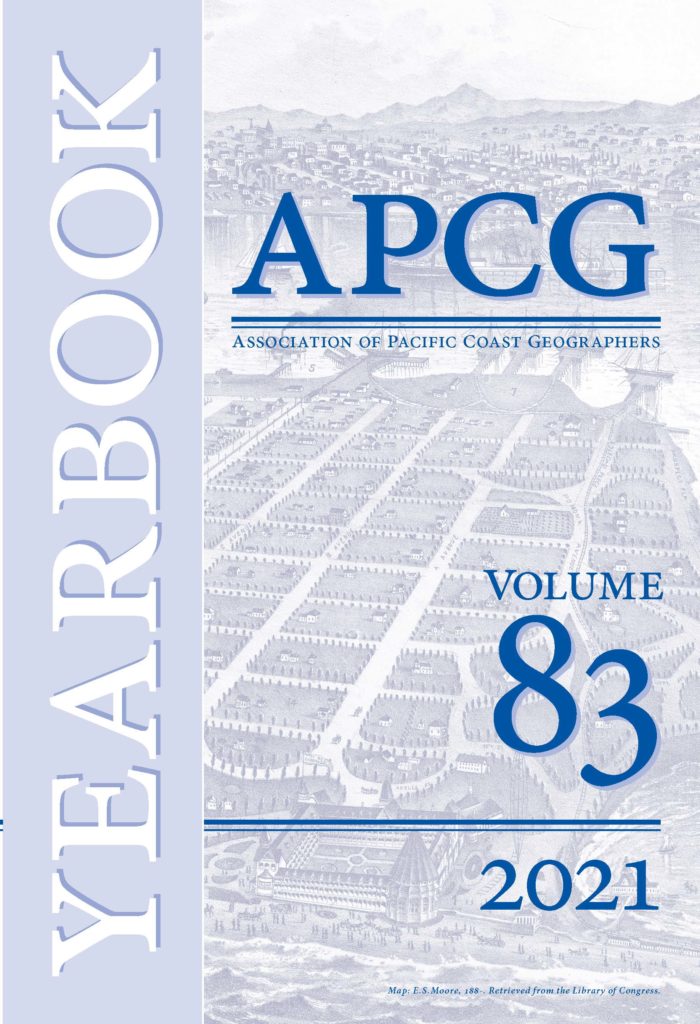
Volume 83 (2021)
Editor Craig S. Revels reflects over the COVID-19 pandemic and how it has affected geographers and members as he states:
Last year’s volume was published in a time of great uncertainty as the COVID-19 pandemic swept across the world, and this year’s unfortunately arrives under similar conditions, slowly improving though they may be. The tragedies, disruptions, and general state of societal affairs during the pandemic will not soon be forgotten…
Geographers have been at the forefront of research into the spread of COVID-19 since the earliest days of the pandemic, and Steve Graves and Petra Nichols contribute an analytical perspective on infection rates in Los Angeles County. In particular, they statistically identify a causal relationship between infection and a range of key socioeconomic and demographic variables, a relationship influencing the location and rate of spread for the disease. They leave us to consider how those factors must be addressed in any preparations for future public health crises.
In a significantly different context, Ray Sumner and John Menary
demonstrate that taking students into the field, always a valuable exercise, is even more rewarding when it leads to unexpected discoveries and challenges our carefully laid plans. In this case, a straightforward field methods class oriented around the Los Angeles River instead became an open-ended, student-driven exploration into the social dimensions of heritage, ethnicity,
culture, and urban development.
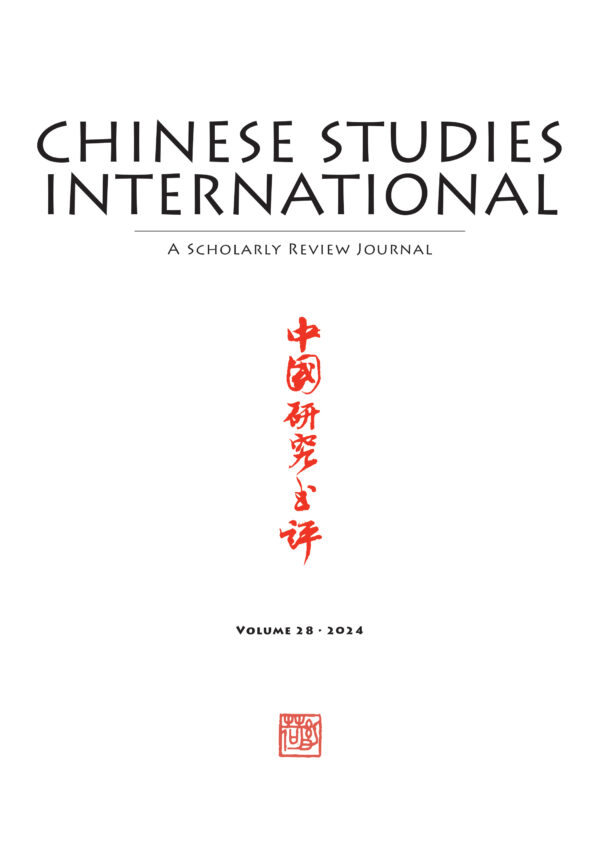
Volume 28 (2024)
The Manchu Language at Court and in the Bureaucracy under the Qianlong Emperor by Mårten Söderblom Saarela (review)
Christopher P. Atwood
Chinese Investments in Southeast Asia: Patterns and Significance by Evelyn Goh and Nan Liu (review)
Sophal Ear
Confucian Relationism and Global Ethics: Alternative Models of Ethics and Axiology in Times of Global Crises by Jana S. Rošker (review)
Yong Li
The Dong World and Imperial China’s Southwest Silk Road by James Anderson (review)
Morris Rossabi
The Power of Chinatown: Searching for Spatial Justice in Los Angeles by Laureen D. Hom (review)
Fredy González
Find the introduction, reviews, Emerging Scholars, and more at Project MUSE.
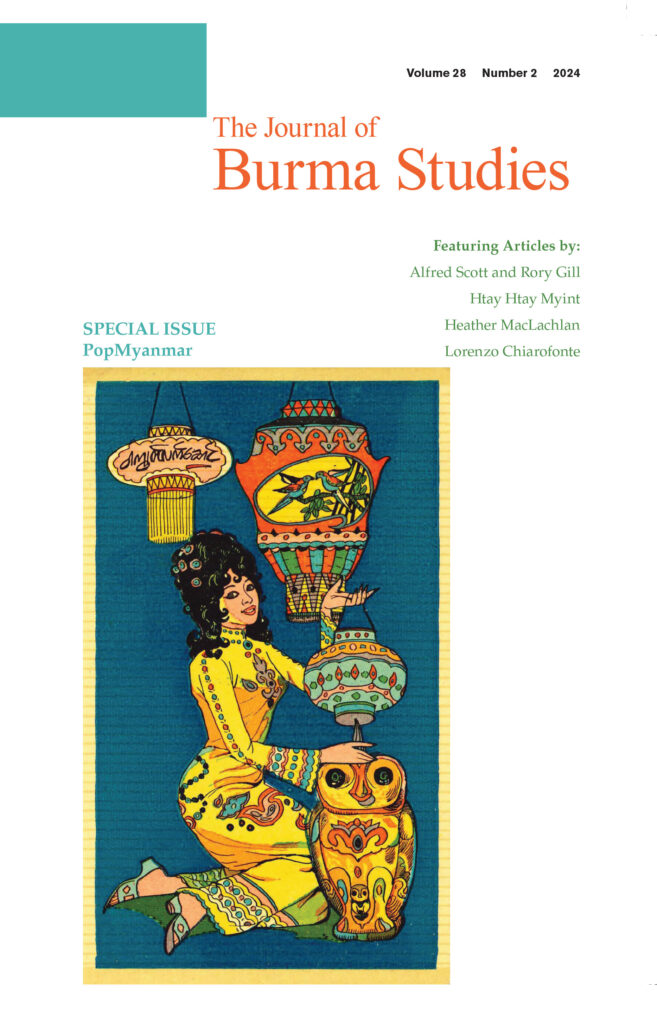
Volume 28, Number 2 (2024)
The Special issue is introduced by Editor Jane Ferguson who states:
Given the tremendous, enduring Burmese interest in—and affection for—local and transnational popular culture, The Journal of Burma Studies is proud to present this special issue: PopMyanmar. Various platforms for popular culture distribution, from print media to music to the internet, are embedded in everyday practices. Pop culture’s modes and meanings of consumption are constantly refashioned through history, taste, and caprice. Yet it is not free for all: these artifacts are still beholden to the political economy at large. Popular culture, as an essential part of modern society’s mainstream, is thus a reflection of its dominant values. As a site for cultural contestation, pop culture can influence imaginings for new political futures.
Find this introduction, articles and more at Project MUSE.

Volume 17, Issue 2 (2024)
Basic Grammar of Khamti Shan
Douglas Inglis
The Interaction of Digital Technology and Literacy Practices in Nuosu Script, China
Susan Walters
Notes on the Phuan Lects Spoken in Xiengkhouang, Thathom, and Borikhane (Laos)
Jean Pacquement
Development of the Periphrastic Causative Construction with a Causative Marker Thām in Thai
Piroon Piyamahapong
On the Binding Preference for Thai Reflexives: The Role of Morphology, Syntax, and Pragmatics
Naparat Meechanyakul
Find these research papers, data, papers, book reviews and more at eVols.
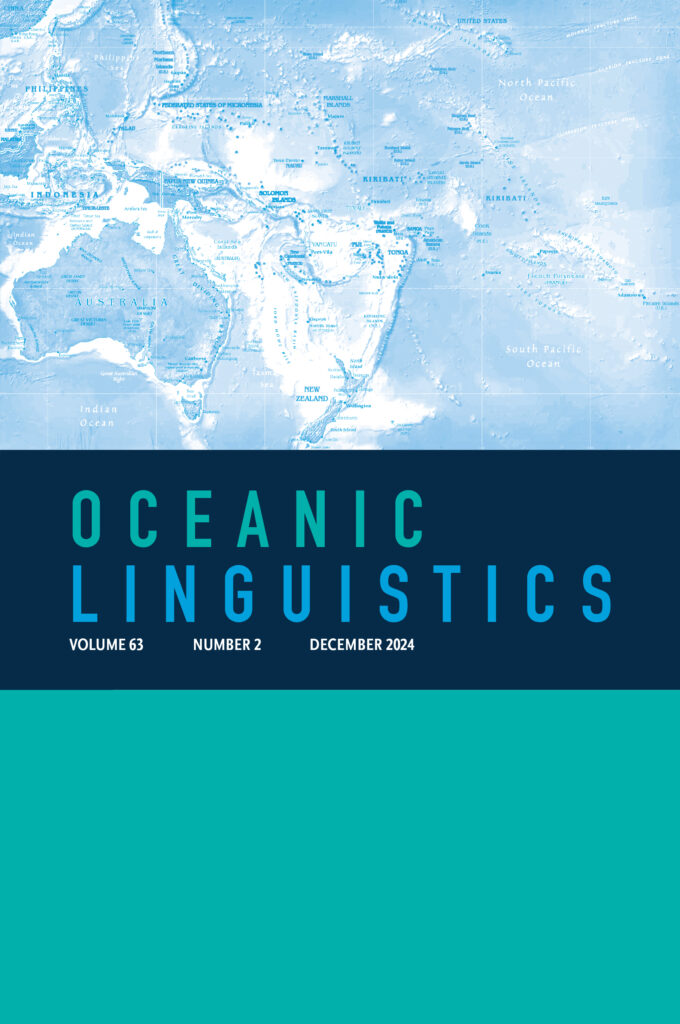
Volume 63, Issue 2 (2024)
Voice in Land Dayak Languages
Carly J. Sommerlot
Unstressed Vowel Syncope in Maybalay Atayal as a Result of Positional Augmentation
Hui-chuan J. Huang
Formation of Euphemism in the Bidayuh Language: A Study on the Bukar–Sadong and Biatah Dialects
Angelia Marjorie Fabian and Yvonne Michelle Campbell
The Classification of Irarutu and Koiwai: A New Proposal
Antoinette Schapper and Erik Zobel
Thomas Neil Headland (1935–2024) and Janet Darlene (Wolff) Headland (1934–2023)
Jason William Lobel
Find these articles, reviews, Recent Publications, memoriams, and more at Project MUSE.
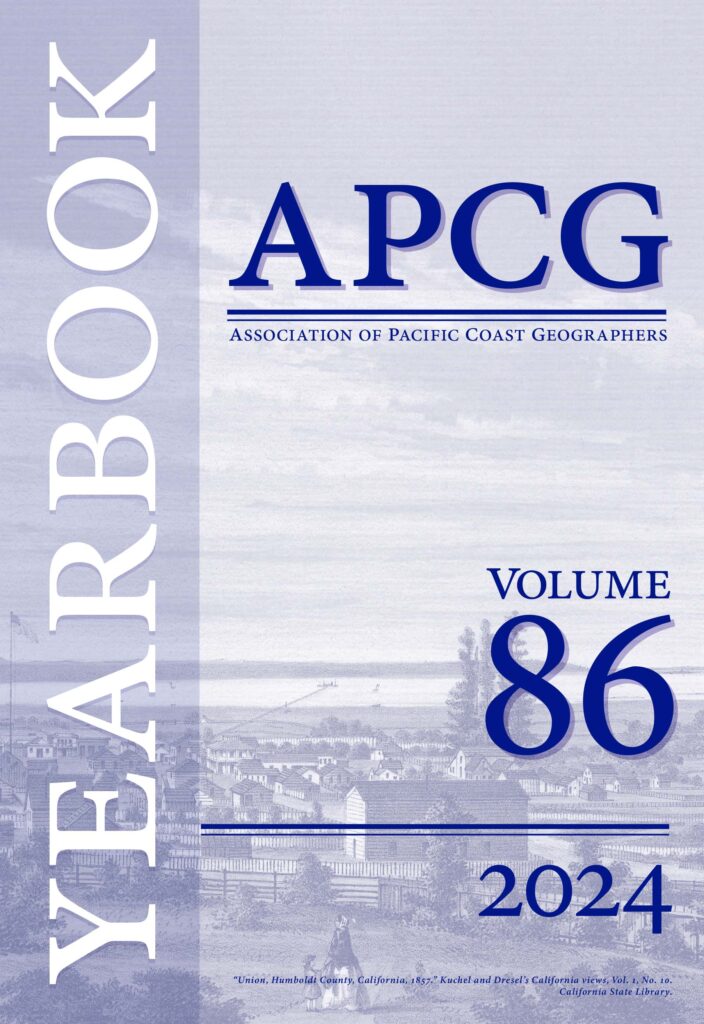
Volume 86 (2024)
Why COVID-19 Still Matters: A Geographer’s Perspective
Kris Bezdecny
Exploring Squatting in Bucharest Through Public Policy Discourse Analysis
Jasmine Arpagian
In and Out of Berkeley Geography, 1951–1963
William M. Denevan
Trieste Through Time: A Geographer’s Brief Impressions
Ray Sumner
Equilibrium and Non-Equilibrium Adjustment of Tributary Drainages in Response to Downcutting of the Salt River, Northeastern Sonoran Desert, Arizona
Micheala Roberts, Matthew Haar, Ophelia Messer, and Ronald I. Dorn
Find these articles, book reviews, reports, awards, abstracts, and more at Project MUSE.
Rapa Nui Journal‘s archive is now available on eVols, an open-access, digital institutional repository for the University of Hawai‘i community and researchers around the world.
The Rapa Nui Journal is the official, peer-reviewed journal of the Easter Island Foundation (EIF). The journal serves as a forum for interdisciplinary scholarship in the humanities and social sciences on Easter Island and the Eastern Polynesian region.
The journal launched in 1984. Volumes 1 through 28 can be freely accessed via eVols and recent content can be viewed at Project MUSE.
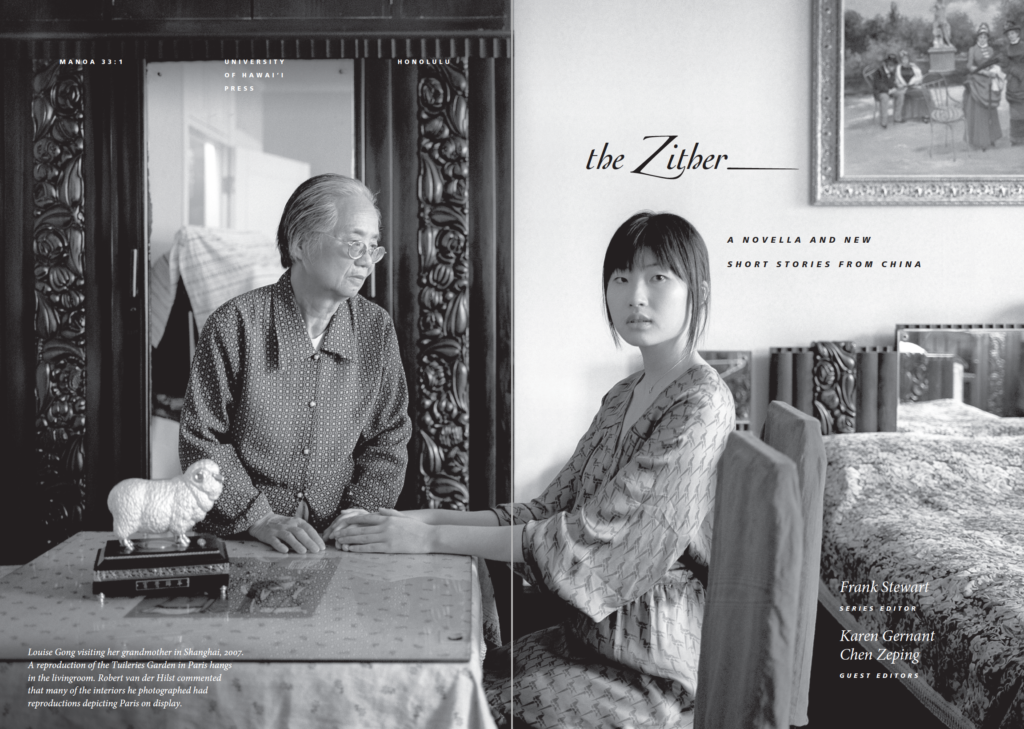
Featured in this Mānoa volume is The Woman Zou, the third in a series of novellas by the distinguished woman writer Zhang Yihe. Born in 1942 in Chongqing, Sichuan, Zhang Yihe was the daughter of Zhang Bojun, a high official in the Chinese Communist Party who was purged in 1957 and labeled a public enemy. By association, Zhang Yihe was convicted of counterrevolutionary activities and sentenced to twenty years in a remote prison camp. After serving ten years, she was released and allowed to return to Beijing in 1979. When she retired in 2001 from teaching at the Chinese National Opera Academy, she began writing her novellas based on the lives of her fellow women prisoners. Her nonfiction books were banned in China and she became an outspoken critic of China’s censorship laws. In 2004, she received the International PEN Award for Independent Chinese Writing. The award committee wrote that
Zhang Yihe’s writing is not only an indictment of the age of darkness, but it is also an affirmation of the indefatigable human dignity and a negation of all attempts to destroy this dignity… Zhang Yihe’s work illustrates the rarely seen courage among contemporary Chinese writers to defend freedom, dignity and historical memories.
The other outstanding writers in this volume are Yi Zhou, whose writing awards include the first prize for novellas and short stories in the Yellow River Literature competition, the Dunhuang Literary Award, and the Lu Xun literary prize, and Zhu Wenying, who is considered one of the leading representatives of post-70s women writers and has received the Annual People’s Literature Prize, among other awards.
The Zither was translated and guest edited by Karen Gernant and Chen Zeping.
“An Office in the Ocean”: An interview with author Thomas Farber at The Hawai‘i Review of Books
Podcast: Michael Ellsberg interviews author Thomas Farber
The Rumpus Mini-Interview Project: Leland Cheuk interviews author Thomas Farber
A letter from author Thomas Farber to Mānoa journal
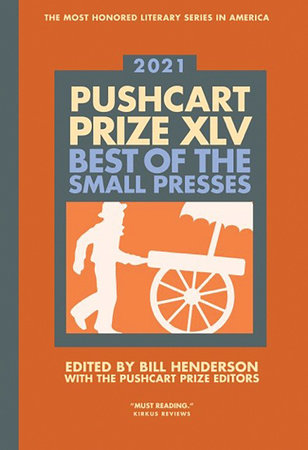
Two Mānoa pieces are included in the new Pushcart anthology, including Xiao Xiao’s “Crime against Grief: Myth of an Age” (translated by Ming Di and Frank Stewart) and Tang Donhong’s essay, “Chairman Mao is Dead!” (translated by Anne Henochowicz). Both are included in the Mānoa volume, Tyranny Lessons.

Like The Zither? MĀNOA publishes two compelling issues annually of international literature. Subscribe here.
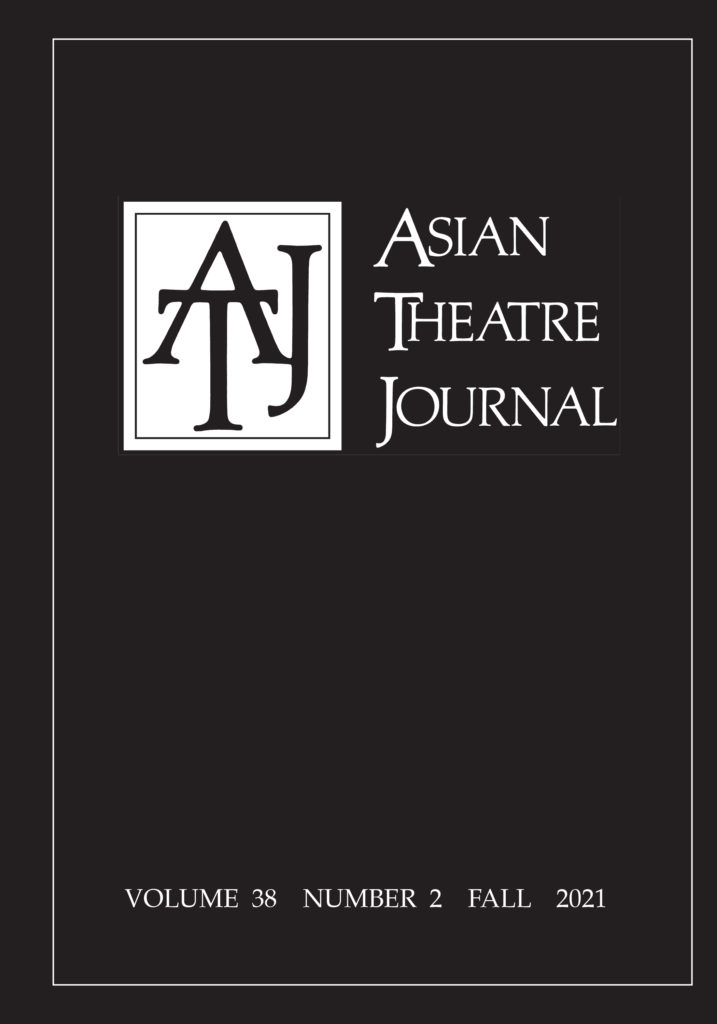
Volume 38, Number 2 (2021)
The new issue includes the following articles and reports:
Raktim Pariwar’s Red Lanterns: Dance and Cultural
Revolution in Nepal
Anna Marie Stirr
The Tokyo Festival World Competition 2019
Cody Poulton
Find more research articles, reports, and reviews at Project MUSE.
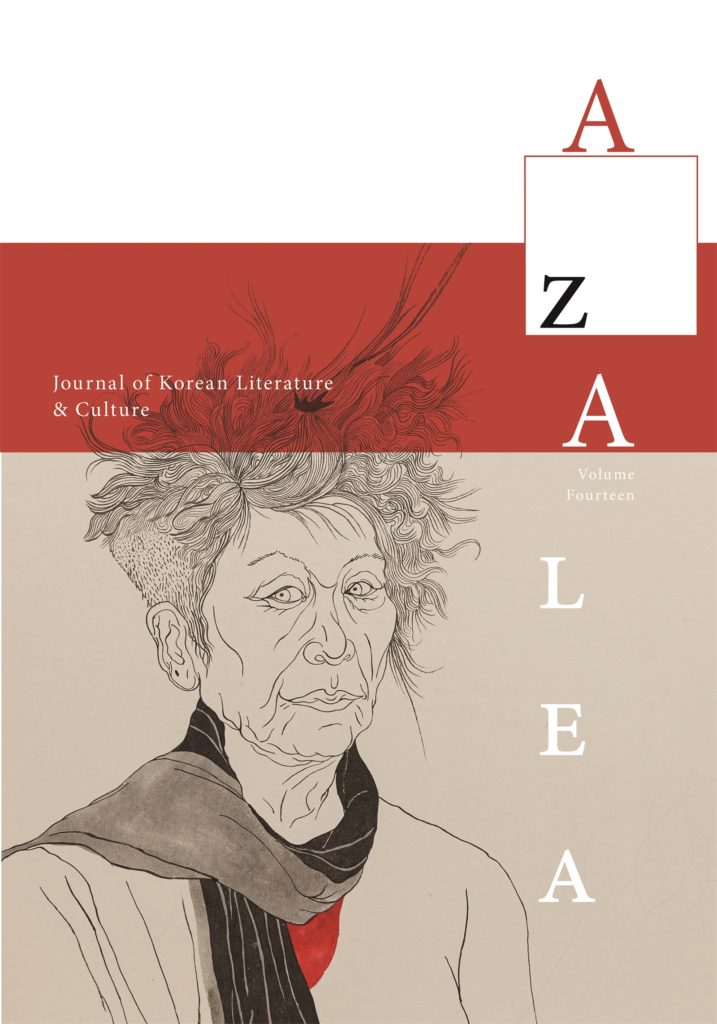
Volume 14 (2021)
From the Editor Young Jung-Lee:
One of the most important recent shifts in Korean literature is found in gender conflict. This “Special Feature: Gender Trouble in Korean Literature and Society,” guest-edited by Hye-Ryoung Lee, shows a fundamentally new perspective through six scholars reading Korean Literature and Society. Over the past decade, the #MeToo Movement has shaken the world, and Korean society has been no exception, as can be seen in Choi Young-mi’s poem “En,” introduced here with six critical essays. Even before its publication, “En” was the focus of media attention, and it remained a hot topic in Korean society for years due to Choi’s high-profile court battles.
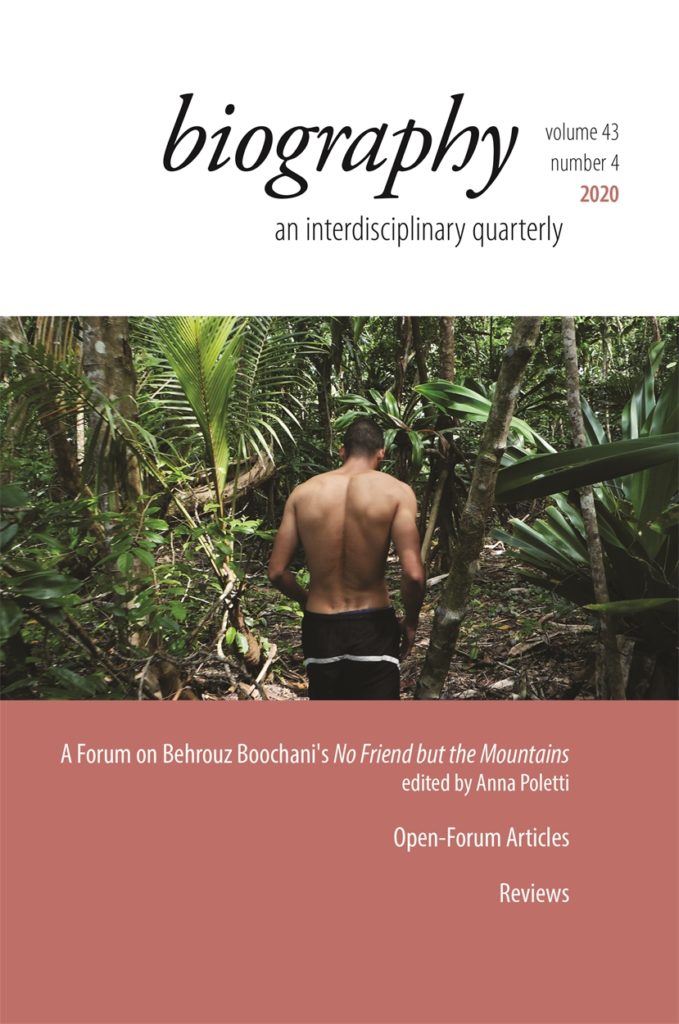
Volume 43, Number 4 (2020)
From Coeditor Anna Poletti:
With this forum, we, the editors of Biography, inaugurate a new feature of the journal that aims to respond to and amplify specific examples of the power of life writing as a cultural, political, and social practice, and which document key moments in the evolution of that practice. In this forum, No Friend but the Mountains is discussed as both a profoundly localized text responding to, making knowledge about, and exposing a highly specific and complex set of conditions, and as a uniquely transnational text that speaks to and about a global phenomenon. Its highly innovative use of life writing as a narrative technique and epistemological practice warranted, in our minds, a concentrated response from the journal. Commissioning and editing this response has renewed my appreciation for the primary concerns of lifewriting scholarship: tracking the mercurial power of personal storytelling to crystalize the contemporary moment in such a way that new knowledge emerges from the entanglements it depicts, and the entanglements it drags its readers into.
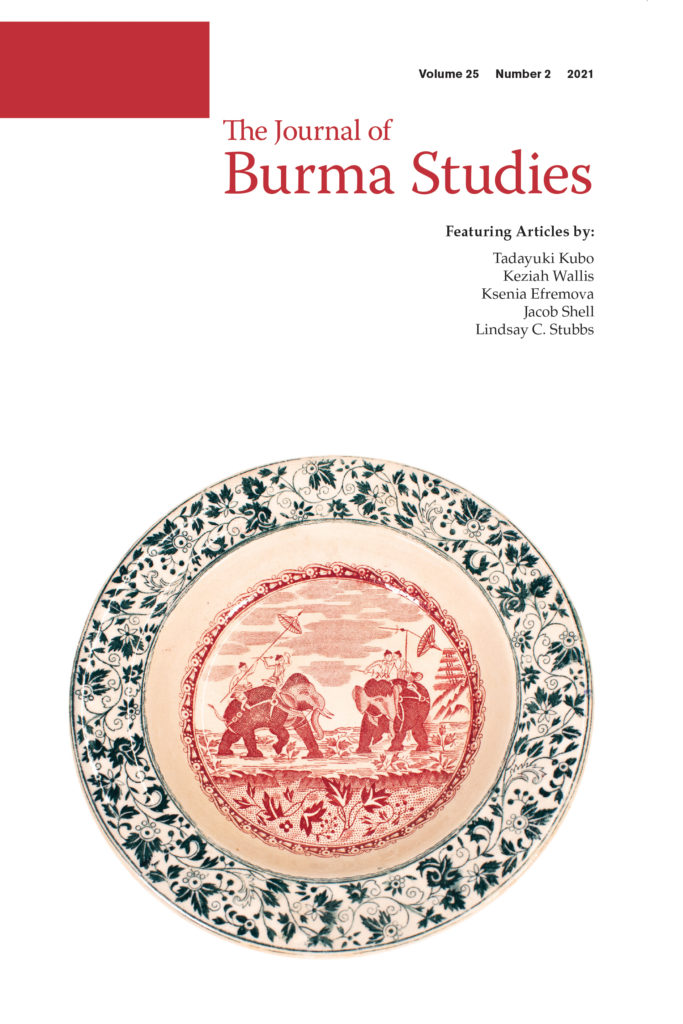
Volume 25, Number 2 (2021)
The new issue includes the following articles:
Ethnocentrism or National Reconciliation: Rethinking
Ethnic Relations and the History of Karenni
Tadayuki Kubo
Nats in the Land of the Hintha: Village Religion
in Lower Myanmar
Keziah Wallis
Elephant Riders of the Hukawng Valley, Kachin State:
Evasive Mobility and Vadological Geography
Jacob Shell
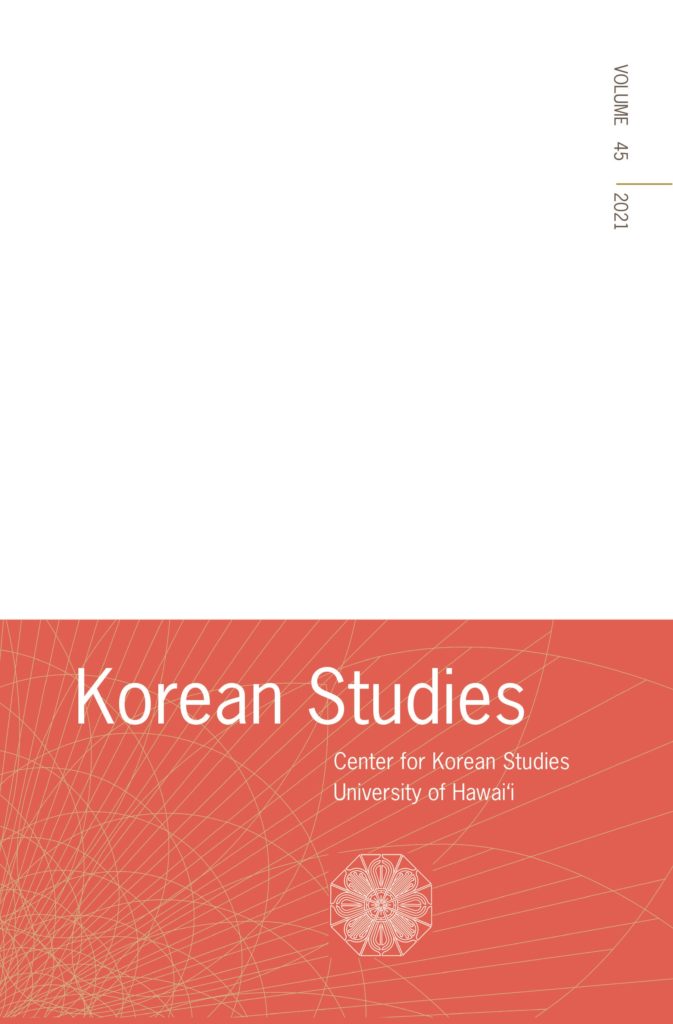
Volume 45 (2021)
From the Editor Cheehyun Harrison Kim:
This analytic potency of migration is superbly demonstrated in this volume’s Special Section Unsettling Korean Migration: Multiple Trajectories and Experiences, guest edited by Sunhee Koo (The University of Auckland) and Jihye Kim (The University of Central Lancashire). Sunhee Koo and Jihye Kim have brought together papers on labor (Yonson Ahn and Jihye Kim), ritual life (Marcus Bell), cultural identity (Sunhee Koo), and artistic production (Hee-seung Irene Lee and Soojin Kim). The six engrossing articles deal with how the Korean diaspora—in Argentina, Germany, Japan, China, and the United States—have shaped and represented their particular situations through negotiation, resilience, and creativity. The authors are highly critical of any national framework, and they see diasporic life as contexts of not only sorrow and sacrifice but also innovation and regeneration. Sunhee Koo and Jihye Kim offer a detailed explanation in their Introduction.
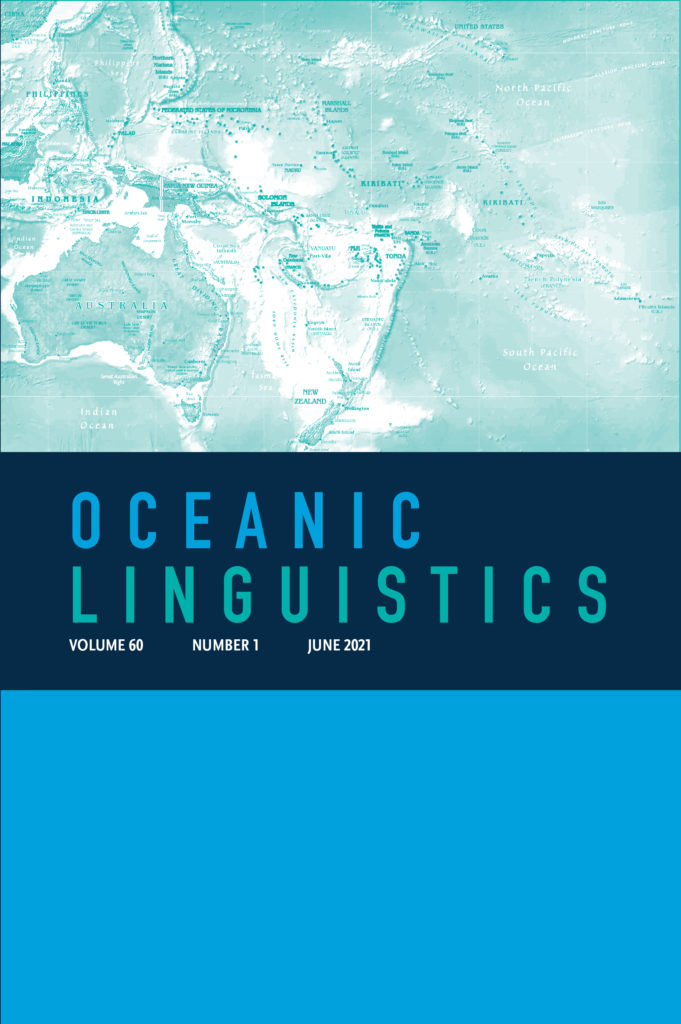
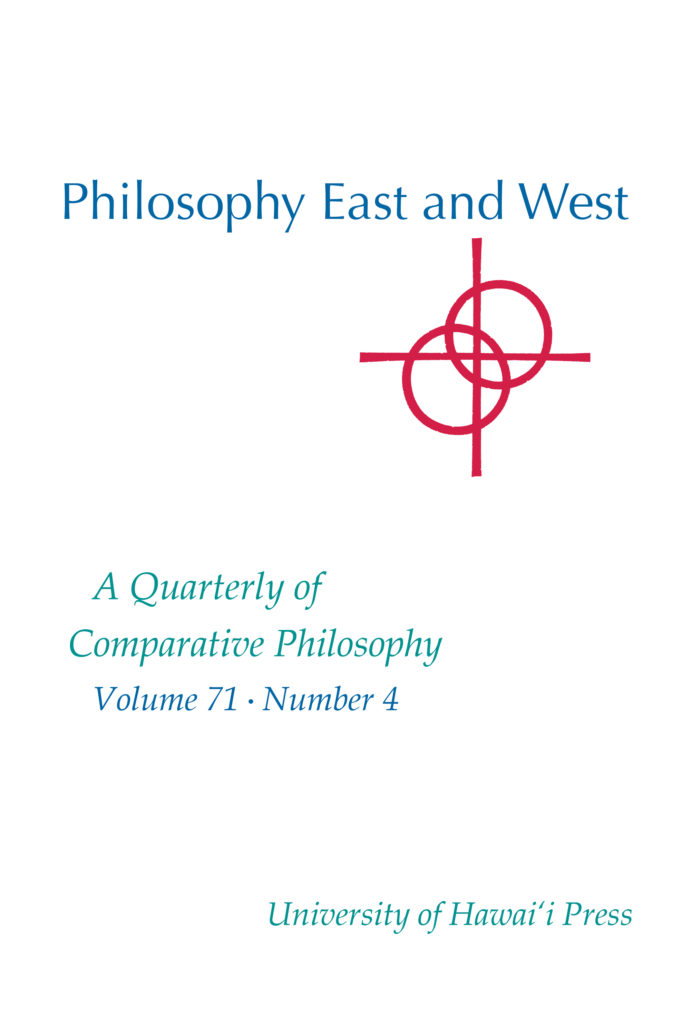
Volume 60, Number 1 (2021)
The new issue includes the following articles:
Avaipa, a Language of Central Bougainville
Jason Brown,Melissa Irvine
East Polynesian Subgrouping and Homeland Implications Within the Northern Outlier–East Polynesian Hypothesis
William H. Wilson
Toward a Comparative Typology of ‘Eating’ in Kanak Languages
Anne-Laure Dotte, Claire Moyse-Faurie
Find more research articles and reviews at Project MUSE.
Volume 71, Number 4 (2021)
The new issue included the following articles and translations:
Jian’Ai: Considerations From the “Greater Selection”
Susan Blake
Patterning the Myriad Things: Holism, Harmony, and Anthropogenic Influence in the Huainanzi
Matthew Hamm
Confucianism and Totalitarianism: An Arendtian Reconsideration of Mencius versus Xunzi
Lee Wilson
“America’s National Character” by Watsuji Tetsurō: A Translation
Kyle Michael James Shuttleworth, Sayaka Shuttleworth, Watsuji Tetsurō
Find more research articles, translations, and reviews at Project MUSE.